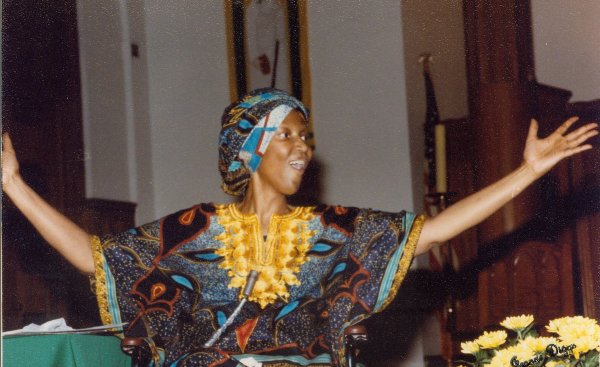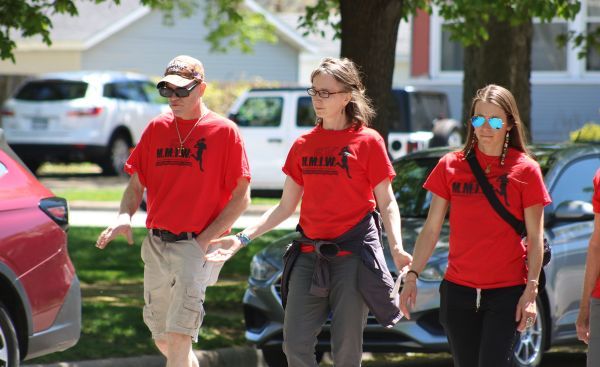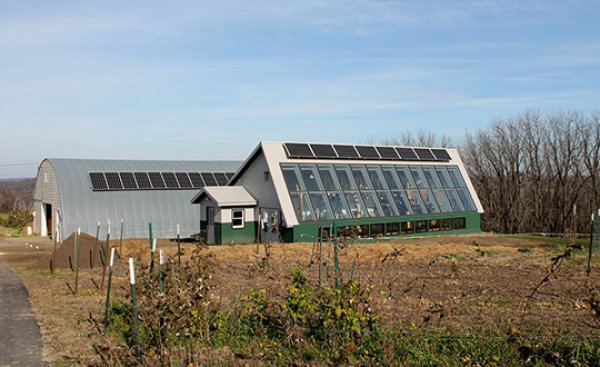Become a Sister
Do you desire to live a life of prayer, community and service?
Discern your call with us. We are Catholic sisters ... vowed Franciscan women centered in Eucharist. Our mission is to be loving presence through prayer, witness and service. We are dedicated to sharing life in community, which centers us in prayer and deepens the meaning of our consecrated life – our vows of poverty, consecrated celibacy and obedience.
We share our gifts for the common good seeking to actively promote the reign of God. We are inspired to bring the love of Christ that we encounter in the chapel out to the world. We are dedicated to responding to the needs of this time as we accompany all who face systemic inequities and as we provide a compassionate presence and give witness to the Gospel of Jesus Christ.
Upcoming Discernment Events
Day of Prayer and Action
Saturday, March 28, 2026 | 9:30 a.m. - 3 p.m.
St. Rose Convent, La Crosse, Wisconsin
Have you ever wondered what it looks like to live out your faith in tangible, everyday ways?
Join us for a day of prayer, conversation and hands-on service in the La Crosse community.
Lunch and snacks provided.
No cost to attend.
Register by March 20.
Individualized Discernment Opportunities
Come and See | St. Rose Convent | Ongoing
Mass and Lunch | St. Rose Convent | Ongoing
Coffee and Conversation with a sister | Near you | Ongoing
Email discerning@fspa.org to make arrangements according to your schedule.
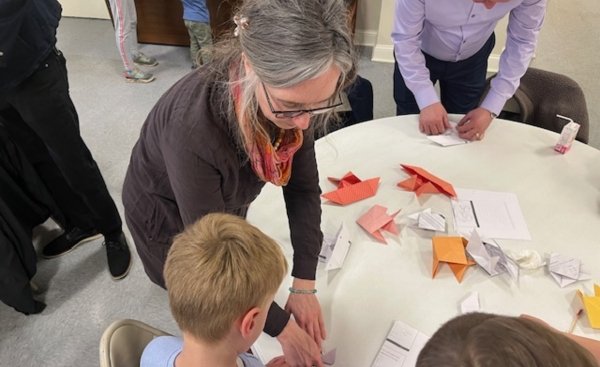
Sister Kristin Peters ministers in Chicago. During a recent campaign to raise awareness of Line 5 pipeline threats, Sister Kristin coordinated educational opportunities in her parish.
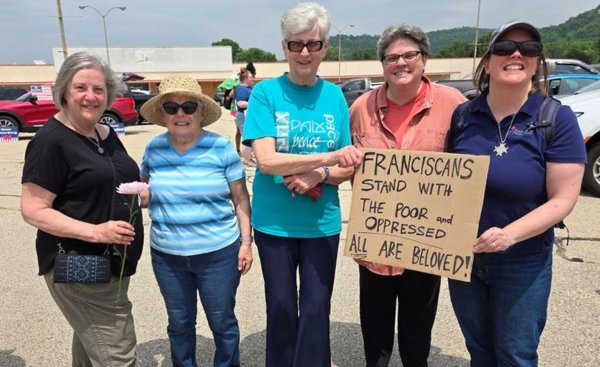
Sisters Julia Walsh, Laura Nettles, Lucy Ann Meyer, Karen Lueck and affiliate Vicky Freybler are all active in social justice. At a recent rally, they shared an "all are beloved" message.
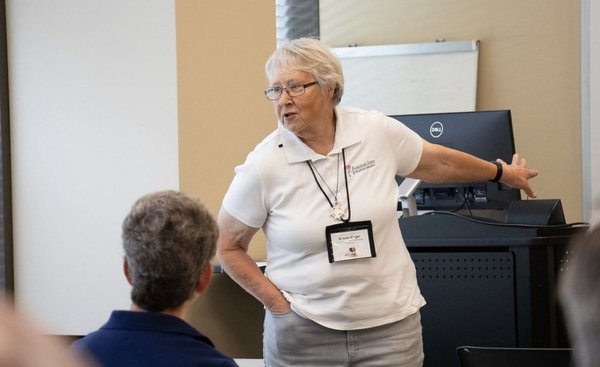
Sister Lucy Slinger is a leader in our commitment to caring for creation. She leads Canticle of Creatures workshops (here to the Association of Franciscan Colleges and Universities).
Connect with Us
Email Sister Julia: discerning@fspa.org
Call or text: 608-797-8345
Foundation and Charism
We commit ourselves to witness our love for God in service to others. We strive to bring new life, meaning and hope to a suffering and searching humanity. Two of our early leaders, Mother Aemiliana Dirr and Mother Antonia Herb, were Franciscan women who worked to establish a community devoted to perpetual adoration and serving the needs of all. This fuels our charism, or spiritual gift, to be loving presence.
As Franciscan Sisters of Perpetual Adoration:
- We live as a Franciscan Eucharistic community that responds to the needs of the times by sharing the loving presence of God we know in the Adoration Chapel with people on the margins of society.
- Our spirituality is based on the teachings of St. Francis and St. Clare of Assisi. We emphasize simplicity, poverty and love for all creatures. As Franciscans, we strive to live in harmony with God’s creation and treat others with kindness and compassion.
- We seek to follow the universal call to holiness by our public profession of vows. We wear contemporary clothes (as women in a Vatican II church) and live in small groups or individually, usually near our ministry sites. A community medal and ring are signs of our FSPA commitment.
- We center our lives in prayer; adoration of the Blessed Sacrament is our most sacred tradition. Our prayer lives also include meditation, contemplation, Scripture reflection, liturgy of the Hours, and Mass. Shared prayer and faith are balanced with private and public prayer.
Discern with us
read our newsletter
Reach out to the discernment office
Email Sister Julia Walsh: discerning@fspa.org
Call or text: 608-797-8345
Steps to FSPA Life
To begin your initial discernment, you may call or text the FSPA vocations team: Sister Julia, at 608-797-8345 or send her an email at discerning@fspa.org; or Susan Amble, vocations@fspa.org. The discernment mailing address is Discernment Office, 912 Market Street, La Crosse, WI 54601.
Discerner
When a woman seeks information and guidance from the FSPA Discernment Office or another FSPA in discerning her call to vowed life, she begins an informal time of discernment. Discerners must:
- desire a deeper relationship with God and a life of Gospel service
- be 21-50 years old with at least one year of college or work experience
- be active members in the Catholic Church
- be free from marriage vows and responsibility for minor children
- wish to live in community and to minister according to the FSPA mission
Candidate
Candidates continue developing personal spirituality, learn FSPA history and traditions and Franciscan spirituality and values while working within and experiencing community life.
Novitiate (two years)
Franciscan Sisters of Perpetual Adoration in the novitiate experience two years of study and deep discernment. During the canonical year she learns more about the Church, the community's constitution, the vows of celibacy, obedience, and poverty and spends time integrating Franciscan values. The apostolic year is a time of continued study of the vows and integration into ministry.
Temporary Vows (typically six years)
After professing temporary vows, an FSPA lives her vows in community and grows in a Franciscan way of life. Careful attention is given to balancing ministry, prayer, community life, and personal enrichment and preparing for permanent commitment.
Final Vows
A sister publicly affirms her commitment for life. After professing her perpetual vows, she receives a ring, which identifies her as a full participant in the FSPA community for the rest of her life. She is committed to and guided in ongoing Franciscan formation.
Transferring to FSPA
For Catholic Sisters discerning transfer from another religious congregation, the first step is connecting with the FSPA president who invites the sister to a time of initial relationship. If you're a Catholic Sister looking for transfer information, visit Transfer to FSPA.
Vows
In our vocation as vowed women religious we are grounded in the observance of these vows:
Poverty: Franciscan Sisters of Perpetual Adoration have vowed to live simply in the spirit of the Beatitudes. We reverence all of God's gifts and rejoice in the goodness of creation. We hold all things in common which allows us to devote our community resources to serving others.
Celibacy: Sisters also commit to living and sharing a community lifestyle within this vow. Community life frees us to cultivate and enjoy personal relationships-both within and outside the congregation.
Obedience: Members of the FSPA community find that we can accomplish great things when we are united in our efforts. Through this vow, we commit ourselves to the congregation's mission to serve God, the church and society. Listening to the voice of the Spirit in our community, ourselves and the world enables us to discern how our unique gifts foster our mission.
Transfer to FSPA
A sister discerning transfer from another religious congregation, contacts the FSPA president who invites the sister to a time of initial relationship. The sister may visit St. Rose Convent or other FSPA centers, she may visit formally with leadership, or visit with other FSPA members. If she wishes to continue exploring the possibility of transfer to FSPA, transfer guidelines are reviewed.
A formal letter of request to the major superiors of both congregations begins the formal transfer process. An autobiography, physical examination report, and letters of reference also need to be sent to the FSPA president. In the early stages of the process, a behavioral assessment is conducted.
Orientation
After dialogue and discernment, a companion sister is appointed. The companion sister will act as a guide, companion and mentor. She will facilitate the phases of orientation, integration and incorporation for the transfer sister. The mission councilor will introduce the sister in transfer into a local community, and she is officially welcomed into the congregation by a simple ceremony of entrance during which she receives the FSPA medal.
Integration
A sister in transfer plans, along with her mission councilor and her companion sister, for ongoing ministry and community living, consistent with holistic living. During this period, the sister in transfer strengthens her relationship with the community.
This final phase of the process of transfer occurs when the final vows are made according to the FSPA Constitutions. This ceremony of incorporation occurs at St. Rose Convent, and the sister receives the FSPA ring that signifies full membership in our congregation.
Contact
Sister Sue Ernster
608-782-5610
Meet our sisters
See the sisterhood in action! Discover religious life through the voices and experiences of Franciscan Sisters of Perpetual Adoration. Our video collection offers an intimate look at the joys, challenges and deep purpose that share sisters' lives, faith, service and community. Whether you're discerning a call, curious about sisterhood, or simply seeking inspiration, these authentic stories will move and uplift you.
Explore our movements
We are committed to these movements, we call them our provocative movements:
- Building relationships that stretch us to be people of encounter who stand with all suffering in our Earth Community
- Being freed through joyful Gospel Living to be transformed in love and goodness for community and mission
- Celebrating authentically unity in diversity by challenging our white privilege and working toward equity and inclusion of all
Connect with Us
Email Susan: vocations@fspa.org
Email Sister Julia: discerning@fspa.org
Call or text: 608-797-8345


